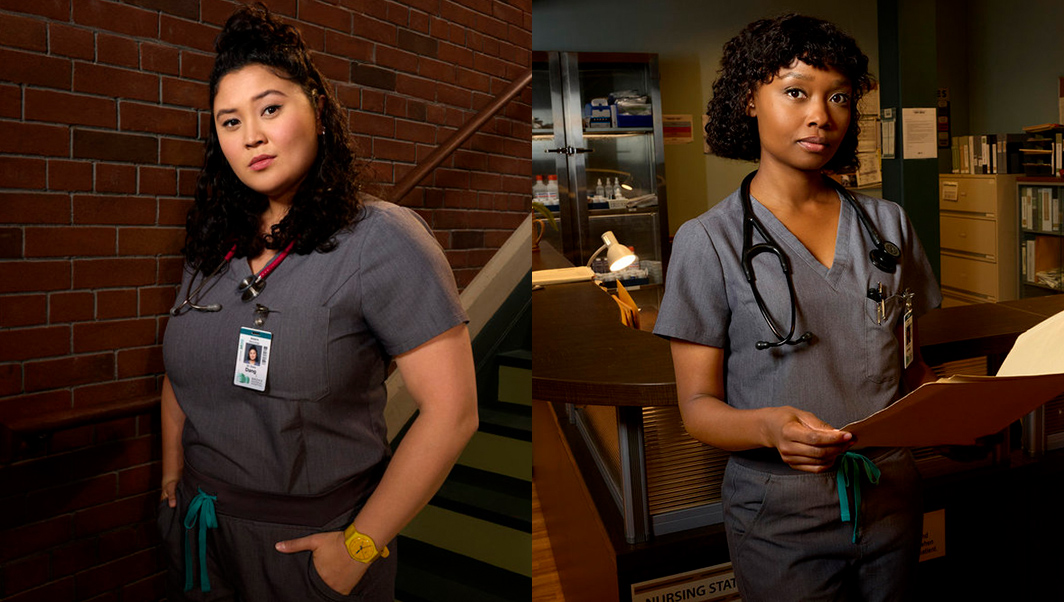Exclusive Interview: Aury Krebs and Ashleigh LaThrop on Finding Strength, Vulnerability, and Humor in ‘Brilliant Minds’


In Brilliant Minds, Aury Krebs and Ashleigh LaThrop deliver captivating performances that elevate the show’s powerful themes of resilience, self-discovery, and empathy. Through their nuanced portrayals of Dana and Ericka, they bring depth and humanity to characters grappling with personal challenges that resonate widely. Both actresses expertly balance moments of vulnerability, creating a connection that feels genuine and heartfelt.
Inspired by the extraordinary life and work of world-famous author and physician Oliver Sacks, Brilliant Minds follows a revolutionary, larger-than-life neurologist and his team of interns as they explore the last great frontier—the human mind—while grappling with their own relationships and mental health.
Pop Culturalist sat down with Aury Krebs and Ashleigh LaThrop to delve into their journeys bringing Dana and Ericka to life, the challenges and rewards of portraying such layered characters, and the impact they hope Brilliant Minds will have on viewers.
PC: Aury, throughout the series, Dana appears to be an open book, often outspoken about her anxieties. However, it seems she uses humor as a defense mechanism to mask the pain she’s carrying inside. You’ve done a brilliant job capturing the nuances of this character. How did you find your way into her and create that space for yourself, especially in Episode 6, where she opens up about her past in such an emotional arc?
Aury: Thank you so much for saying that; it means a lot. I had to do extensive research because, luckily, I’ve never personally experienced a panic attack. However, there are many people close to me who have, so I had this wealth of intimate knowledge from their experiences.
I’m also a big podcast listener, so I’ve tuned into a lot of discussions around anxiety, panic disorders, and the variety of ways people experience panic attacks. What’s interesting is that panic attacks can look different for everyone. While there are some universal elements, they can manifest differently depending on the person. For my preparation, I talked extensively with my girlfriend, who has experienced panic attacks. She walked me through the physical sensations, the mental process during an attack, and coping mechanisms.
For Dana, panic attacks have been part of her life as an adult, and she’s learned to handle them—primarily relying on medication. But in Episode 6, she experiences one of her worst attacks since her first, and, unusually, she’s unprepared. Watching her push through that moment is raw and terrifying for her.
I was quite anxious about portraying this, as I’m still new to TV and come from a musical theatre background. This was a series of firsts for me, and whether Ashleigh intended it or not, she became a mentor to me. We grew close on the show, and I shared my anxieties with her about portraying this part of Dana authentically, without being superficial or forced. She advised me, ‘In moments that are emotionally demanding or high-stakes for your character, it’s not about you or your acting. It’s not about whether you think you’re doing a good job. It’s about reaching out to the people watching, making them feel seen and understood.’ That became my priority. Her guidance helped shift my perspective and eased some of the pressure. It became about doing my best for those who need to see this on TV.
PC: You accomplished that. Ashleigh, you have an incredible gift for helping audiences connect with the characters you portray. Ericka is someone who strives for perfection, and I think that’s something so many people can relate to, especially those from marginalized communities who aren’t afforded as many opportunities. As an artist, you always seek roles that resonate with you. What was it about Ericka that struck a chord for you, and how did that connection help you tap into her emotional core?
Ashleigh: What really drew me to Ericka is her intelligence. She’s a Harvard graduate, at the top of her class—she’s incredibly smart and driven. It’s fascinating to play someone so hyper-intelligent, especially as a Black woman, given the archetypes that people sometimes try to impose. I thought, “This is a character I would love to bring to life.”
As for her need for perfection, I do think that’s something people from marginalized communities, particularly people of color, experience. There’s often this added pressure to prove ourselves because we don’t have the same opportunities that others might receive automatically. I feel it too—the need to be ten times better because certain opportunities might go to someone else for reasons beyond my control. Ericka feels this so strongly; she’s terrified that if she ever slips up, everything she’s worked for could fall apart. It’s been really compelling to play that need for control and that drive to be the best so no one can take away what she’s earned.
PC: I think both of your characters will make audiences feel seen. Aury, you’ve already touched on this, but you come from a theatre background, where you know your character’s story from beginning to end. Television, however, is a medium where you discover more with each episode. How much of an adjustment has it been moving from stage to screen? What have you learned about your craft?
Aury: Oh my God, I’ve learned so much during this time. I feel like everything I know now, everything I’ve gained beyond just my life experience, has come from this process. It was a huge adjustment, but being on TV has always been my dream. Growing up, television was my refuge. I was a kid who didn’t fit in—I got bullied, I was different from everyone else in my community. I grew up in a small, mostly White suburb outside of Philadelphia, and there weren’t many openly queer people, maybe one or two in my high school. I was different. I was weird, a little obnoxious—even more so back then. TV was my solace. I was a diehard Grey’s Anatomy fan, going home each day thinking, ‘What are these characters going to get into next?’ I became so attached. As someone with undiagnosed A.D.D., I tended to latch onto things intensely. I was obsessed with this idea of a story that keeps unfolding. I love theater because I enjoy taking time to ruminate, to build a world with people, and I do miss it after filming our first season. But what I’ve always wanted is to grow alongside a character, and that’s been so thrilling in TV. You get to delve deeper, layer in more nuance, and you spend more time with the story. That’s been a big shift.
I’ve also learned so much from my colleagues. To your question for Ashleigh, she’s a lot like Ericka—she’s one of the hardest-working people I’ve ever met. She has pages of notes, thoughts, and questions about her character. Even the smallest detail about her backstory, she’ll fold into her performance in ways only she knows, but it adds so much life beneath the lines. I think that’s why her performances resonate so deeply. On set, everyone has a different method, so you have to be ready to play in a way that’s different from theater. It’s been an incredible journey.
PC: We hope to see many more seasons of this journey. Ashleigh, at the start of the show, Ericka tells Oliver that she’s the real quarterback of the team, and I think that’s absolutely true. She has such deep empathy for everyone she treats. Which patient will have the biggest impact on her journey this season, and why?
Ashleigh: I think it’s a patient named June, who we meet in Episode 8. June is an elderly patient, and her story really resonates with Ericka. She opens up to June in a way we haven’t seen with other patients. Typically, Ericka is in full professional mode, focused on helping, but June brings out a personal side of her. Ericka feels most comfortable with older people, and June gets her to reflect on her own life in a way that’s new for her. June encourages her to find a better work-life balance, which is something Ericka has never prioritized. In a way, June inspires her to actually start living beyond work.
PC: That’s such a fantastic episode for your character! Episode 7 is a real tear-jerker. One last question for you both—I asked Alex [MacNicoll] and Spence [Moore II] this earlier: Oliver is known for his unconventional methods. What’s the most unusual or unexpected thing you’ve done to prepare for a role?
Ashleigh: What a great question! I don’t know… Aury?
Aury: I was just thinking, Ashleigh’s had way more roles than I have.
Ashleigh: Oh, you’ve done theatre, don’t even start.
Aury: This is really hard…
Ashleigh: This is such a dumb answer, but I have to fill the silence. I got cast in this really physically demanding, acrobatic role. I had never done anything like it before, so I started working out and training intensely. I was in the gym every day and eating really clean. It’s probably the healthiest I’ve ever been. And I have such a sweet tooth—Aury knows how out of control it is!
Aury: I’m going to pivot from the question because I don’t think I’ve done anything outrageous—which is sad because I like to think I’m eclectic—but when I first met Ashleigh while filming the pilot, she told me, “I’m not eating sugar right now because my sweet tooth is out of control. Once I start, I can’t stop.” And I thought,”Oh, this perfect girl who’s pretty and skinny is giving up sugar?” [laughs]
Ashleigh: [laughs]
Aury: Then, a few weeks later, I watched her reintroduce sugar, and this girl can put away four desserts…
Ashleigh: …in one sitting, or over a single day.
Aurey: She even eats dessert before dinner!
Ashleigh: If you haven’t tried it, I recommend it! It makes everything better because you’ve already had what you were craving.
Aury: But she also does it so no one asks for a bite and she doesn’t have to share.
Ashleigh: I’ve never said that! You came to that conclusion.
Aury: Maybe you blacked out while you were saying it. [laughs]
Ashleigh: [laughs]
Make sure to follow Aury (Instagram) and Ashleigh (Instagram). Brilliant Minds airs every Monday at 10/9c on NBC. Watch it the next day on Peacock.
Photo Credit: Brendan Meadows/NBC
Recent Posts
‘Paper Flowers’ Reminds Us That Time Doesn’t Define a Life—Love Does
Mahesh Pailoor’s Paper Flowers is as delicate and enduring as its title suggests. Inspired by…
Exit Interview: Derrick Levasseur on Targeting the “Coffin Queens,” Emotion vs. Objectivity, and Competing Among Legends in ‘The Traitors’ Season 3
In 2014, Derrick Levasseur cemented his place among Big Brother legends by winning Season 16…
Exclusive Interview: Patrick Luwis on Axel’s Tough Exterior, Hidden Struggles, and What’s Ahead in ‘Cobra Kai’ Season 6, Part 3
Few shows have mastered the balance between action, heart, and character-driven storytelling quite like Cobra…
Exclusive Interview: Melissa Roxburgh and Patrick Sabongui Break Down the Mind Games and Moral Dilemmas of ‘The Hunting Party’
The pulse-pounding world of The Hunting Party is built on a simple but chilling premise:…
Jack & Jack Announce European Dates for ‘Symbiosis’ Tour—New Single on the Way
Jack & Jack are back—and this time, they’re making it their biggest, boldest chapter yet.…
Exclusive Interview: Sean Ryan Fox and Michael D. Cohen Talk ‘Henry Danger: The Movie,’ the Future of the Franchise, and More
The wait is finally over! The beloved cast of Henry Danger is back and ready…


